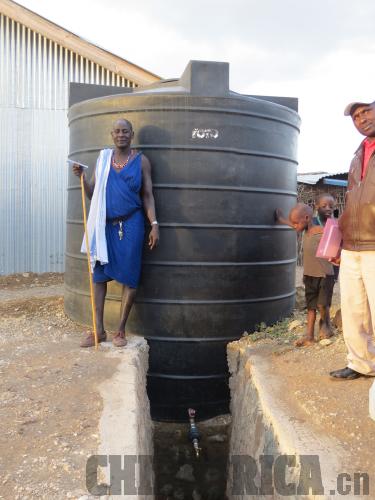|
 |
|
A water tank for rain collection COURTESY PHOTOS |
The Maasai people are probably among the most well-known ethnic groups in East Africa for their reputations as brave warriors. But they have been plagued with a major problem for several generations: limited access to water.
"Once you mention water, clean or unclean, what comes to my mind is long distance," said an elder leader in a Maasai village in Kenya. "We spend so much time looking for water for our animals and for our own consumption that we have no strength left for anything else." It is true that the women and children in Maasai communities hardly have time for anything else after the trek to fetch water, which usually takes them 8 hours each day.
The situation, however, could be very different as Africa has abundant water resources.
"In the popular mind, Africa is seen as a dry continent," said Dennis Garrity, Director General of the World Agroforestry Center. "But overall, it actually has more water resources per capita than Europe." However, according to him, much of Africa's rain comes in bursts and is rapidly swept away or is never collected.
Achim Steiner, Executive Director of the United Nations Environment Program (UNEP), shares the same view. "Widely deployed, rainwater harvesting can act as a buffer against drought events for these people, while also significantly supplementing supplies in cities and areas connected to the water grid," said Steiner.
It is only recently that the importance of such harvesting as a buffer against climate-linked extreme weather has become a reality in water planning, with African countries relying almost exclusively on rivers and underground supplies. However, technology limitations have jeopardized the application and promotion of this strategy.
With the support of China's Ministry of Science and Technology and UNEP, a project on Rainwater Harvesting for Augmenting Water Resources and Ecosystems Management under the UNEP-China-Africa Cooperation Program on the Environment has been operating in African countries since 2008.
"A major challenge for the promotion of rainwater harvesting in Africa is that most water managers and policy makers have the misconception that rainwater harvesting is limited to roof top harvesting, which is common in many parts of Africa," said Professor Ma Chengxiang, Deputy Director of the Research Institute for Water Conservancy of Gansu Province.
In addition, Ma said communities do not appreciate the contribution of rainwater harvesting to water resource management, poverty and hunger reduction.
"All these factors have limited the success of the current projects in Africa," said Ma.
Rainwater harvesting is low-cost and simple to deploy and maintain, and able to transform the lives of households, communities and countries across the continent. But its massive potential in Africa has yet to be discovered, asserts Ma.
To raise general awareness among the public and policy makers and build capacity at both the individual and institutional levels, the Research Institute for Water Conservancy of Gansu Province has organized intensive technical training/promotion workshops on various occasions in China and Africa. To date, over 100 experts from 10 African countries have participated in the training and worked as a bridge between China and Africa in the field.
Several demonstration sites of rainwater harvesting have been built at local communities and schools in Kenya and Nigeria. These pilot projects function as living advertisements among the poor and dispersed, where "seeing is believing" is the popular form of demonstration.
A remote Maasai village in the Savannah has become one of the beneficiaries of the project, thanks to village resident Simintei Kooke, who is now the Deputy Director of Water Resources at the Ministry of Water and Irrigation of Kenya. Through the project, Kooke was fortunate enough to receive higher education in rainwater harvesting technology in China. CA
(Author Dr. Mohamed A.S. Abdel-Monem is the Regional Team Leader of Ecosystem Management in ROA/UNEP and the point person for the Program from UNEP. Ms. Tian Ping is Dr. Mohamed's assistant, special coordinator of the Program)
|